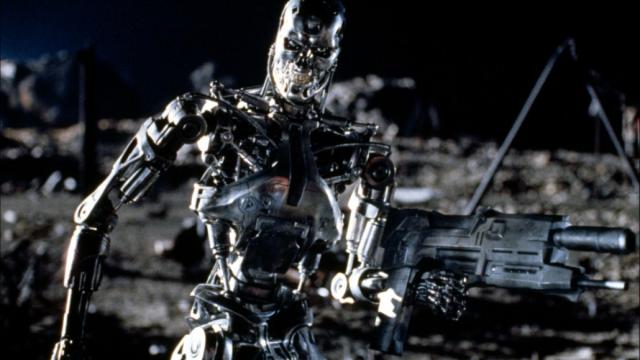There’s no question that the age of autonomous killing machines is upon us. But some very smart and very influential people would like to turn back the clock.
Over 1,000 people from the worlds of tech, space travel, computing, and mathematics have signed an open letter calling for an end to the autonomous weapons arms race. The letter will be presented tomorrow in Buenos Aires at the International Join Conference on Artificial Intelligence.
The list of signatories includes everyone from your average grad student in mathematics to Noam Chomsky and Steve Wozniak. Stephen Hawking and Elon Musk, who have both warned about the potential dangers of autonomous killing machines in the past few months, have also signed their names to the letter.
Their concern seems to be centered on the idea that humans will be out of the loop on the battlefields of tomorrow. Cruise missiles and human-operated drones? Those are ok, according to the letter. But anything beyond that? Not ok.
The full letter appears below:
Autonomous weapons select and engage targets without human intervention. They might include, for example, armed quadcopters that can search for and eliminate people meeting certain pre-defined criteria, but do not include cruise missiles or remotely piloted drones for which humans make all targeting decisions. Artificial Intelligence (AI) technology has reached a point where the deployment of such systems is — practically if not legally — feasible within years, not decades, and the stakes are high: autonomous weapons have been described as the third revolution in warfare, after gunpowder and nuclear arms.
Many arguments have been made for and against autonomous weapons, for example that replacing human soldiers by machines is good by reducing casualties for the owner but bad by thereby lowering the threshold for going to battle. The key question for humanity today is whether to start a global AI arms race or to prevent it from starting. If any major military power pushes ahead with AI weapon development, a global arms race is virtually inevitable, and the endpoint of this technological trajectory is obvious: autonomous weapons will become the Kalashnikovs of tomorrow. Unlike nuclear weapons, they require no costly or hard-to-obtain raw materials, so they will become ubiquitous and cheap for all significant military powers to mass-produce. It will only be a matter of time until they appear on the black market and in the hands of terrorists, dictators wishing to better control their populace, warlords wishing to perpetrate ethnic cleansing, etc. Autonomous weapons are ideal for tasks such as assassinations, destabilizing nations, subduing populations and selectively killing a particular ethnic group. We therefore believe that a military AI arms race would not be beneficial for humanity. There are many ways in which AI can make battlefields safer for humans, especially civilians, without creating new tools for killing people.
Just as most chemists and biologists have no interest in building chemical or biological weapons, most AI researchers have no interest in building AI weapons — and do not want others to tarnish their field by doing so, potentially creating a major public backlash against AI that curtails its future societal benefits. Indeed, chemists and biologists have broadly supported international agreements that have successfully prohibited chemical and biological weapons, just as most physicists supported the treaties banning space-based nuclear weapons and blinding laser weapons.
In summary, we believe that AI has great potential to benefit humanity in many ways, and that the goal of the field should be to do so. Starting a military AI arms race is a bad idea, and should be prevented by a ban on offensive autonomous weapons beyond meaningful human control.
The letter was coordinated through the Future of Life Institute, whose mission is explicitly described as “developing optimistic visions of the future.”
The part that might be confusing after reading the letter? We already have military autonomous killing machines, depending on your definition of “in the loop.” And there are surely autonomous technologies currently being used by the military that the public has no idea about.
The signatories clearly would like to draw a line in the sand. But the question becomes whether that line has already been crossed. Guys like Musk and Wozniak might need to invent a time machine if they want to put that genie back in the bottle.
[h/t The Guardian]
